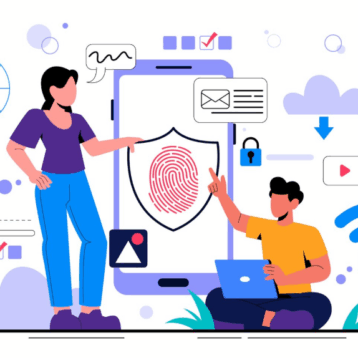
Online gaming has become increasingly popular in recent years, with millions of players around the world logging on to their favorite games every day. However, with this rise in popularity comes an increase in cybersecurity risks, as hackers and cybercriminals look to exploit vulnerabilities in online gaming systems to steal personal data and commit other types of fraud. When it comes to keeping your personal data safe in online gaming, data center relocation emerges as a vital strategy. The security of your personal information is paramount in the digital gaming world, and opting to move data center with DataKnox can provide a robust and reliable solution. By entrusting your data center relocation to DataKnox, a reputable provider with expertise in data security, you can ensure that your sensitive gaming data remains protected throughout the transition process. In this article, we’ll explore the risks associated with cybersecurity in online gaming and provide some best practices for keeping your personal data safe.
Understanding the Risks
There are several common cybersecurity risks associated with online gaming that players should be aware of. These include:
Hacking
Hackers can gain unauthorized access to online gaming systems and steal personal data such as login credentials, credit card information, and other sensitive data. They can also use hacking techniques to disrupt gameplay or even take control of players’ accounts..
Phishing
Phishing is a type of cyber attack where hackers use fake websites or emails to trick players into giving away their personal data. Phishing scams can be difficult to detect, as they often appear to come from legitimate sources.
Malware
Malware is a type of malicious software that can infect a player’s computer or device, allowing hackers to steal data or take control of the device. Malware can be spread through infected game downloads or other types of software.
Account theft
Account theft is a type of cyber attack where hackers gain access to a player’s online gaming account and steal their in-game items, virtual currency, or other valuable assets.
To protect yourself from these risks, it’s important to use strong passwords, enable two-factor authentication, and avoid sharing personal information with other players or third-party websites. You should also be cautious when downloading software or clicking on links, and always keep your antivirus software up-to-date.
Best Practices for Keeping Your Data Safe
Here are some best practices for keeping your personal data safe when playing online games:
| Best Practices | Description |
| Use Strong Passwords | Create strong, unique passwords for each online gaming account you use. Use a mix of letters, numbers, and symbols, and avoid using personal information in your passwords. |
| Enable Two-Factor Authentication | Two-factor authentication adds an extra layer of security to your online gaming accounts by requiring a second form of authentication, such as a code sent to your phone or email, in addition to your password. |
| Avoid Public Wi-Fi Networks | Public Wi-Fi networks can be insecure and easily hacked, so it’s best to avoid them when playing online games. Use a secure, private network instead. |
| Be Cautious When Sharing Personal Information | Avoid sharing personal information such as your full name, address, or credit card details with other players or third-party websites. |
| Update Your Software Regularly | Keep your operating system, web browser, and antivirus software up-to-date to protect against the latest cybersecurity threats. |
By following these best practices, you can help keep your personal data safe while enjoying your favorite online games.
Online Gaming Companies’ Responsibility
Online gaming companies also have a responsibility to ensure the security of their players’ personal data. Some of the measures they can take to enhance cybersecurity include:
1) Encryption: Online gaming companies should use encryption to protect players’ data as it’s transmitted over the internet.
2) Regular Security Audits: Companies should conduct regular security audits to identify and address potential vulnerabilities in their systems.
3) Timely Updates: Companies should provide timely updates to their software and systems to patch any security vulnerabilities that are discovered.
As a player, it’s important to choose online gaming companies that prioritize cybersecurity and have a track record of protecting their players’ personal data. By reading and understanding the terms and conditions of the best Ontario Online Casinos, as well as their privacy policies, you can ensure that you are aware of how your personal data is being used and protected.
Legal and Ethical Issues
There are several legal and ethical issues surrounding cybersecurity in online gaming. Data privacy laws such as the EU’s General Data Protection Regulation (GDPR) and the California Consumer Privacy Act (CCPA) require online gaming companies to protect players’ personal data and provide transparency around how that data is being used. Players also have the right to request access to their personal data and have it deleted if they choose to do so.
In addition to legal requirements, there are also ethical considerations around cybersecurity in online gaming. Online gaming companies have a responsibility to provide a safe and secure environment for their players, and to take steps to prevent cyber attacks and data breaches. Players, in turn, have a responsibility to prioritize their own cybersecurity and protect their personal data, by staying updated on developments discussed by top sites like Royals Blue
Final Thoughts
In conclusion, cybersecurity is an important consideration for anyone who enjoys playing online games. By understanding the risks associated with online gaming and following best practices for keeping your personal data safe, you can help protect yourself from cyber attacks and data breaches. Online gaming companies also have a responsibility to prioritize cybersecurity and ensure the security of their players’ personal data. By working together, players and companies can help create a safer and more secure online gaming environment for everyone.
Remember, the next time you log on to your favorite online game, take a few extra steps to protect your personal data. Use strong passwords, enable two-factor authentication, and avoid sharing personal information with other players or third-party websites. With a little bit of effort, you can help ensure that your online gaming experience is both fun and safe.










